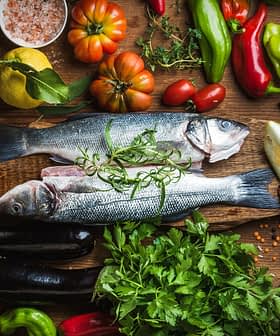Study: Plant-Based Diet Alleviates Reflux as Effectively as Medications
Adherence to a plant-based diet reduces reflux symptoms as effectively as the troublesome drugs.
 10.0K reads
10.0K readsA study found that a plant-based Mediterranean-style diet paired with alkaline water can reduce reflux symptoms as effectively as traditional medications like proton pump inhibitors, with fewer side effects. The diet, high in fruits, vegetables, nuts, and grains, led to improvements in reflux symptoms and other health conditions, offering a natural alternative to medication.
The traditional reflux medications of proton pump inhibitors (PPIs) are associated with a host of health problems such as a higher risk of strokes, heart attacks, dementia and even premature death. A new study found close adherence to an eating plan similar to the Mediterranean diet (MedDiet) reduces reflux symptoms as effectively as the troublesome drugs.
Include plants that are high in chlorophyll in your diet and you’ll see a profound improvement to the health of your digestive system.
In the study, one group of patients were treated with PPIs, while another group consumed a 90- to 95 percent whole food, plant-based, Mediterranean-style dietary regimen paired with alkaline water. After six weeks, the results showed 54.1 percent of the PPI group experienced a six-point decrease in their Reflux Symptom Index, while 62.6 percent of the dietary group experienced the same improvement.
Although the patients in the study suffered from laryngopharyngeal reflux (LPR), the diet should also alleviate gastro-esophageal acid reflux, otherwise called GERD.
Lead author Craig H. Zalvan said he had prescribed PPIs frequently, but he believed there had to be a better approach to treating reflux, so he started investigating alternatives.
“Although effective in some patients, I felt medication couldn’t be the only method to treat reflux and recent studies reporting increased rates of stroke and heart attack, dementia and kidney damage from prolonged PPI use made me more certain,” said Zalvan.
“I saw a lot of studies using plant-based diets to treat patients for many other chronic diseases, so I decided to develop a diet regimen to treat my laryngopharyngeal reflux patients. The results we found show we are heading in the right direction to treating reflux without medication.”
The diet that produced such impressive results included mainly fruits, vegetables, nuts and grains. Dairy and meat were limited to two or three servings per week. Zalvan called the eating plan Mediterranean in style, but it actually contains less fish and other animal food than the MedDiet.
Both groups followed the standard reflux dietary precautions of abstaining from tea, coffee, soda, chocolate and alcohol. Spicy, fried foods and fatty foods were avoided as well.
Instead of side effects, the diet came with side benefits. Zalvan observed that many patients enjoyed some weight loss, along with a decrease in the need to take medications for conditions like high cholesterol and high blood pressure.
“This study suggests that a plant-based diet and alkaline water should be considered in the treatment of LPR. This approach may effectively improve symptoms and could avoid the costs and adverse effects of pharmacological intervention as well as afford the additional health benefits associated with a healthy, plant-based diet,” wrote the authors.
The study conducted by researchers from Northwell Health’s Feinstein Institute for Medical Research and New York Medical College was published in JAMA Otolaryngology Head and Neck Surgery.
In an interview with Olive Oil Times, David Friedman, a clinical nutritionist, explained why a plant-based diet is beneficial for reflux.
“The standard American diet is a major cause of digestive issues such as acid reflux (heartburn), diverticulitis, GERD and irritable bowel syndrome. PPIs offer only temporary relief and come with a plethora of undesirable side effects.
“For decades, I’ve advised my patients to eat more leafy vegetables to help them reduce gastric acid and improve their bowel movements. Being constipated is a major contributing factor because the longer food stays in the colon, the more ammonia it produces, which in turn, creates an acidic environment. Green leafy vegetables contain chlorophyll, which cleanses and alkalizes the stomach and colon,” Friedman said.
“Green leafy vegetables, such as spinach, collard greens, and kale, are also rich in vitamins and minerals like iron, calcium, and magnesium, which can help the lower esophageal sphincter (LES) to properly contract.
“The LES is a muscle that connects the top of the stomach with the bottom of the esophagus. It first relaxes to allow food to enter the stomach and then closes tightly to keep stomach acid from entering the esophagus. However, the LES may become weakened over time when you consume too much fried and processed foods, citrus juices or sugar. Include plants that are high in chlorophyll in your diet and you’ll see a profound improvement to the health of your digestive system.”









